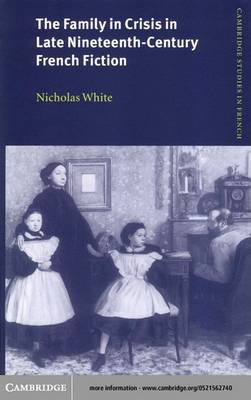Cambridge Studies in French
1 total work
The Family in Crisis in Late Nineteenth-Century French Fiction
by Nicholas White
Published 13 January 1999
The Family in Crisis in Late Nineteenth-Century French Fiction, first published in 1999, focuses on a key moment in the construction of the modern view of the family in France. Nicholas White's analysis of novels by Zola, Maupassant, Hennique, Bourget and Armand Charpentier is fashioned by perspectives on a wide cultural field, including legal, popular and academic discourses on the family and its discontents. His account encourages a close rereading of canonical as well as overlooked texts from fin de siecle France. What emerges between the death of Flaubert in 1880 and the publication of Bourget's Un divorce in 1904 is a series of Naturalist and post-Naturalist representations of transgressive behaviour in which tales of adultery, illegitimacy, consanguinity, incest and divorce serve to exemplify and to offer a range of nuances on the Third Republic's crisis in what might now be termed 'family values'.
